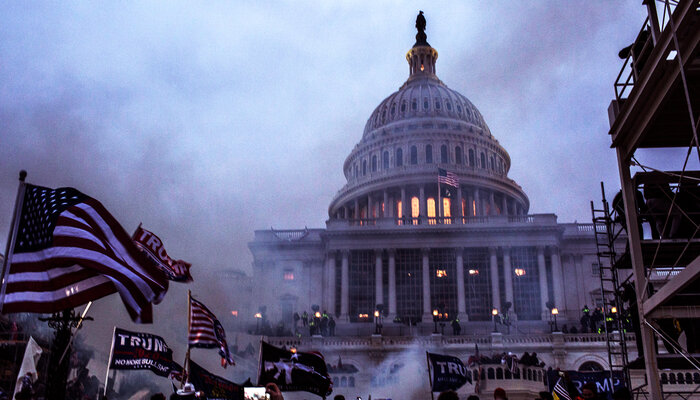Update 1/20/2025: After taking office, Trump pardoned virtually all of the January 6 insurrectionists.
President-elect Donald Trump says that, on the same day that he is inaugurated for his 2.0 presidency, he will pardon people who stormed the Capitol on January 6, 2021. “It’s going to start in the first hour,” he told Time magazine when they interviewed him for their cover story after naming him man of the year, “Maybe the first nine minutes.”
On the campaign trail, Trump described the January 6 rioters as “political prisoners,” conveniently forgetting the fact that those progressing through the criminal justice system were charged by grand juries and convicted by either juries or federal judges. He calls them “great patriots,” even opening his first campaign rally in Waco, Texas, with “Justice for All,” a song recorded over the phone by imprisoned insurrectionists, set to the tune of the “Star Spangled Banner.”
Pardoning them would be, as Brennan Center President Michael Waldman has said, a misuse of the president’s clemency power. And indeed, two-thirds of Americans oppose it, according to a recent Washington Post poll.
Article II, Section 2, of the Constitution gives broad power to presidents to “grant Reprieves and Pardons for Offences against the United States,” excepting only “Cases of Impeachment.” The power to both pardon crimes and commute sentences is unrestricted in any other way, except, perhaps, by the still-untested-in-the-courts limitation that a president may not pardon himself.
In other words, Trump can pardon the January 6 defendants. He would not violate the law or exceed the power extended to him by the Constitution if he did so. But while it would not technically be an abuse of his power to do so, it would be an appalling, unprecedented violation of the trust the American people place in their leaders.
In mid-December, President Biden pardoned 39 individuals convicted of nonviolent crimes and commuted the sentences of some 1,500 additional people who had qualified for early release from prison during the Covid-19 pandemic and succeeded in reentering their communities. He reflected on the exercise of the pardon power when he took that action, saying, “I have the great privilege of extending mercy to people who have demonstrated remorse and rehabilitation, restoring opportunity for Americans to participate in daily life and contribute to their communities.” The group includes “parents, veterans, health care professionals, teachers, advocates, and engaged members of their communities.”
By contrast, according to reporting compiled by NBC’s Ryan Reilly, the January 6 defendants were captured on video brandishing and using firearms, stun guns, flagpoles, fire extinguishers, bike racks, batons, a metal whip, office furniture, pepper spray, bear spray, a tomahawk ax, a hatchet, a hockey stick, knuckle gloves, a baseball bat, a massive Trump billboard, Trump flags, a pitchfork, pieces of lumber, crutches, and even an explosive device during the attack on the Capitol. More than 140 police officers were injured and members of Congress fled the building in fear for their lives. (Biden’s commutation of sentences for 37 people on death row should not be conflated with Trump’s proposed action. Commutation means they will serve the rest of their lives in prison instead of being executed, a far cry from the immediate release Trump has discussed for January 6 defendants.)
It’s even worse if Trump intends to pardon members of the Oath Keepers and Proud Boys organizations convicted of seditious conspiracy, something that he has not ruled out. Judge Amit Mehta, who sentenced the Oath Keepers’ leader, Yale Law School graduate Stewart Rhodes, to 18-years in prison for seditious conspiracy said, “The notion that Stewart Rhodes could be absolved is frightening — and ought to be frightening to anyone who cares about democracy.”
If Trump pardons January 6 rioters, he would be using the pardon power to erase an attack on Constitution and country. The purpose of that attack was his personal benefit — if it had succeeded, it could have permitted him to stay in power after losing the election, contrary to every principle of American democracy. An exercise of the pardon power along those lines would have no resemblance to what the Founding Fathers intended. The pardon power, which was only included after extensive debate, was based on the English “prerogative of mercy” that resided in kings and queens to undo punishment that was deemed too harsh. It was not about rewarding political loyalists.
Pardoning people convicted of plotting to interfere with the lawful and peaceful transfer of power following the 2020 presidential election isn’t a righteous grant of mercy. Few of these defendants have shown remorse and some have shown outright defiance, like Ryan Grillo, who said, “Trump’s gonna pardon me anyways” after Judge Royce Lamberth sentenced him in December. The January 6 offenders Trump has committed to pardoning aren’t people who committed nonviolent crimes in their late teens and early twenties and, having served significant portions of their sentence, are now prepared to return to their communities as rehabilitated individuals deserving of a second chance. If anything, the January 6 defendants’ return would give a boost to the white supremacist and domestic terror groups many of them participated in before they overran the Capitol, and it would severely dampen the deterrent effect of our laws against future aggression.
It has been the practice in most recent administrations to use the Office of the Pardon Attorney in the Department of Justice to review requests for pardons and commutations before they are handed up to the White House counsel and the president for a decision. That process includes an extensive evaluation of each individual applicant’s request, including consultation with prosecutors, lawyers, judges, victims, probation officers, prison staff and others to determine whether the requested clemency would serve the interests of justice without endangering the community. Pardons have often been used in the interests of equal justice when people are serving lengthy sentences that would no longer be handed down or in cases of extraordinary rehabilitation when people have demonstrated a commitment to the future of their communities. None of those considerations will be in play if Trump pardons January 6 offenders.
The key to Trump’s pardons is that they are not about people and their communities. They are about personal loyalty to him. Trump summoned these individuals to the Capitol to support him and now he will pardon them to complete that transaction. Trump will use the pardon power to make it clear that violence and violation of the law can be forgiven in service to himself.
Pardoning the rioters is a grotesque misuse of the pardon power because, cloaked in the appearance of lawful authority, it would put the presidential seal on crimes that go to the heart of an attack on our democracy, an effort to undo the will of the voters and seat a man who lost an election as the country’s leader. By advertising his willingness to pardon the people who supported him rather than the Constitution, Trump is sending a message to the people he is counting on to support him this go-round: If they protect him, he will take care of them. It’s a message fit for a would-be authoritarian.






